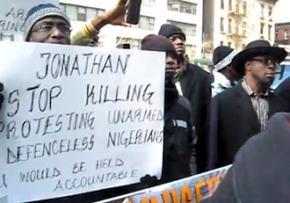Stand with Nigerian protests
reports on international protests in solidarity with demonstrators in Nigeria who are taking on government austerity.
FROM LONDON, to Accra, to Washington, D.C., to New York City, the Nigerian diaspora has organized rallies in solidarity with the ongoing struggle in Nigeria against austerity measures imposed by the government, particularly the cutting of a state gas subsidy.
Cutting the government subsidy increases gas prices to about $1 per liter in a country where two-thirds of the population lives on $1.25 or less a day, despite Nigeria being the third-largest economy in Africa.
These solidarity rallies have expressed anger at Nigerian President Goodluck Ebele Jonathan (nicknamed "Badluck" by protesters), his incompetent government and their corporate friends--namely the Big Oil companies that have devastated the country, environmentally and economically.
In New York City, on January 11, Nigerian students, workers and activists came out alongside Occupy Wall Street activists to show their support for the protests and national strike that have essentially shut down the country.
The event was called by an affinity group of participants in the Occupy Movement in New York City who are organizing to oppose the against the recently passed National Defense Authorization Act. The spirited rally began with a small speak-out in Times Square, followed by a march to the Nigerian consulate, with people chanting, "From Nigeria to New York, power to the people" and singing the Nigerian version of "Solidarity Forever."

At the consulate, protesters held a moment of silence for the Nigerians who have been killed by police repression since the beginning of the protests. This was followed by a speak-out, where many Nigerians, some of whom were affiliated with Occupy Nigeria, voiced their anger and frustration with the government, and their hopes for this struggle.
Fareeda Samusi, a Nigerian college student living in New York, was at the solidarity rally because she was tired of the vast economic inequalities plaguing her country, "The rich get richer, and the poor get poorer. Instead of [the government] cutting subsidies, why not cut the allowances of politicians?" She said that the Nigerian people need to stand up to the government and demand transparency.
Adaobi Ezeodum, another college student who recently moved here for school, added that the politicians in Nigeria, like all politicians, do not care about working people and only make promises until they are in power.
The level of corruption in the Nigerian government also enraged Adeola Awopetu, a small business owner in Nigeria. Before starting his own business, Ola worked long hours under horrible conditions for a local bank in Nigeria. He left when he couldn't endure this working environment.
Ola shared his frustrations about the lack of affordable, accessible or quality health care in his country. He described an instance where a doctor he knew had to deliver a baby by candlelight because there was no electricity on site at the government hospital where he worked.
Shoddy electricity service was a huge topic of discussion at the rally because of how it affects other important aspects of life in Nigeria, such as education, health care and transportation. One speaker, music producer and artist Tino Bendel, said that Nigeria has never gone 24 hours straight without an electricity outage since it became an independent nation-state.
Power outages are a daily occurrence everywhere in the country, despite the fact that Nigeria is the main provider of electricity to four neighboring countries, none of which experience these types of daily outages. Bendel also criticized international financial institutions such as the World Bank and the International Monetary Fund for their destructive policies.
"They are lending money to corrupt leaders, knowing fully well that these corrupt leaders won't give this money to the people," Bendel said. "We need to put pressure on every single person, the United Nations, the oil companies, these banks because they are raping us of our resources."
Lanre Adeleke, a Nigerian socialist, was thankful to the Occupy Movement, which has spread to Nigeria, and expressed his hope that the struggle stops nothing short of revolution.
"We are the common people who work for the resources," said Adeleke. "We are the ones who make the economy grow. We are the ones who make things happen, and we shouldn't be the ones to continue to suffer when a small minority continues to rob us."


